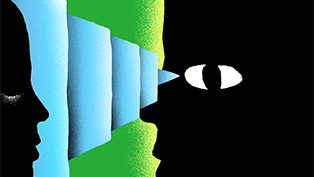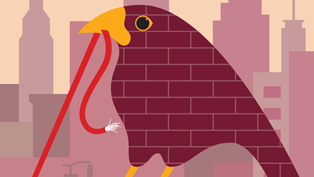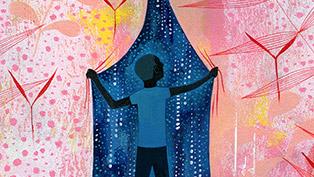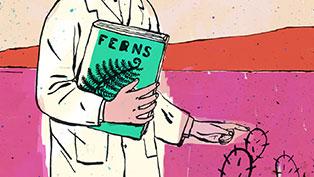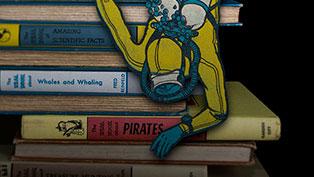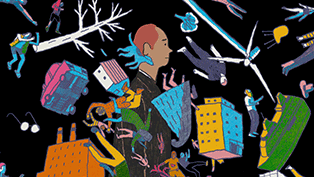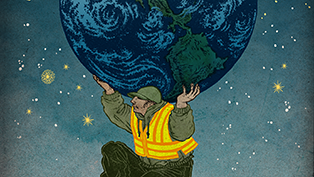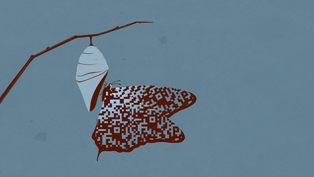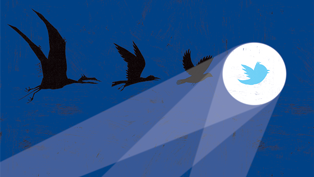![]()
ISSUE 44
4.3MB (EPUB)
They say it’s better to be lucky than good. But
shouldn’t statistics have put the idea of “being” lucky to bed? Or is luck
really all about story, rather than statistics?
PURCHASE
![]()
ISSUE 43
9.2MB (EPUB)
Where have all the real
heroes gone? It’s a refrain you find in articles on our celebrity culture,
movie reviews wondering why modern superheroes need to be so flawed, and in our
own private conversations.
PURCHASE
![]()
ISSUE 42
32.9MB (EPUB)
We are
more concerned than ever with fakes, maybe because it’s easier than ever to
manufacture them. From fake diamonds to fake journals, we inhabit a space
created by technology, complexity, and a fracturing of authority, and spend
plenty of time making stuff up.
PURCHASE
![]()
ISSUE 41
32.9MB (EPUB)
Even
Mother Nature can seem reluctant to choose, keeping cats both dead and alive,
and running up a large multiverse tab. By some accounts, there is no such thing
as time, or events, which means that what we experience as choices are just
mathematical solutions to distant boundary value problems.
PURCHASE
![]()
ISSUE 40
5.9MB (EPUB)
Have you seen the videos of the crow solving an eight-stage
puzzle? Or of Lee Sedol losing to DeepMind? Learning seems to extend everywhere
from the mobile above an infant’s crib to machines to, some argue, evolution
and physical law. As we discover and build new learning systems, the biggest
lessons may be about how we fit into the new landscape around us. READ ONLINE
PURCHASE
![]()
ISSUE 39
4.7MB (EPUB)
When we
think of sports science and technology, the physics of a curveball might come to mind—the hardware. But there is also a high
technology, of sorts, in the software of sport. Without it, would we understand
sportsmanship, and what it means to love playing more than winning? READ ONLINE
PURCHASE
![]()
ISSUE 38
6.6MB (EPUB)
It’s hard to imagine any signal coming from space that would be
of no interest. Our modern definition of noise, as unwanted sound or signal, is a
relatively recent one—the word used to mean strife, and nausea. Is the new
meaning useful? Or does it encourage us to dismiss what we can’t interpret? READ ONLINE
PURCHASE
![]()
ISSUE 37
4.9MB (EPUB)
There
is a miles-long solitary wave trundling its way across an ocean right now. It
will travel for days on end before dissipating its
billions of joules of energy. From motes of methane pushed by distant
starlight, to words smuggled out of a silent place, our world is full of unseen
currents that carry and connect. READ ONLINE
PURCHASE
![]()
ISSUE 36
5.2MB (EPUB)
Aging
may be the only universal process. Everything does it: living things, rocks,
maybe even protons (we’re not sure yet). Despite that—or because of it—we
humans have long dreamed of conquering it. READ ONLINE
PURCHASE
![]()
ISSUE 35
4.4MB (EPUB)
If rules only
exist to be broken, then so do boundaries. After all, a boundary is just a rule
in space. Boundaries end up facilitating exchanges as much as blocking them,
and some of the most productive activities happen in their vicinity. READ ONLINE
PURCHASE
![]()
ISSUE 34
4.4MB (EPUB)
Adaptation is hard—everywhere. Organisms responding to a
changing environment may cycle through failed designs, or perish by evolving
too slowly. A self-driving car moving down an unfamiliar road will suddenly try
to take an imaginary exit. It’s harder to make someone change their mind than
it is to tell them they’re right.
READ ONLINE
PURCHASE
![]()
ISSUE 33
4.5MB (EPUB)
Opposites attract. Or is
it birds of a feather flock together? Our brains could be chaotic storms
governed by strange attractors. Or is the chaos ungoverned, and less important
than we think?
When it comes to attraction, nothing is
simple. READ ONLINE
PURCHASE
![]()
ISSUE 32
4.5MB (EPUB)
Try imagining a universe without color, or time. Unusual, but possible to visualize. Now try imagining a
universe without space. What does it look like? Without space, we seem not to be able to start. READ ONLINE
PURCHASE
![]()
ISSUE 31
4.5MB (EPUB)
Stress is a
complicated adversary. It is a silent killer, but a little bit is good for
you. Pushing things and people past their usual boundaries has made the
world the way it is, and naturally involves the unknown. Would we want it any
other way? READ ONLINE
PURCHASE
![]()
ISSUE 30
4.1MB (EPUB)
Science has taken many of our
putative identities and melted them together. But we are jealous of our human
identities. Those, we’d like to think are different. We’d like to keep them
intact and persistent. Given what we know, is that a fool’s errand? READ ONLINE
PURCHASE
![]()
ISSUE 29
4.5MB (EPUB)
How things become bigger or
smaller reveals a lot about them. How big can a city get and still be a city?
What about a classroom? Can a “theory of everything” describe our universe at
all possible scales? “How much,” we learn, is often just as important as “why”
or “how.” READ ONLINE
PURCHASE
![]()
ISSUE 28
4.2MB (EPUB)
While the near future is a
choice, the distant future is an institution. Governments and non-profits
produce long-term forecasts by the thousands. Fortunes change hands based on
corporate earnings expectations. People have constructed over 10,000 active time
capsules. Despite all of this frenetic activity, the future is more often than
not a surprise. READ ONLINE
PURCHASE
![]()
ISSUE 27
4.9MB (EPUB)
While
the cosmological version is the most famous, it is far from the only dark
matter story in science. There are silent neurons, missing fossils, and
nighttime animal migration; death and conception; algorithms both genetic and
man-made. Seeing, it turns out, isn’t the only path to believing. READ ONLINE
PURCHASE
![]()
ISSUE 26
20.2MB (EPUB)
Envy is green, anger is red, and exoplanet artist
renderings are usually swirly brown. Purple used to mean royal, until the
chemists figured out how to make it cheaply. Blue is usually the last color to
be introduced into a language. And for the philosopher? It’s all qualia. READ ONLINE
PURCHASE
![]()
ISSUE 25
3.7MB (EPUB)
What could we not know about water? As it
turns out, plenty. It covers most of the Earth, but is regularly in short
supply. It is intimately involved in the processes of life, but life on other
planets may not need it. It is inscrutable and unpredictable, but we try to
price it. The debates show no signs of ending. READ ONLINE
PURCHASE
![]()
ISSUE 24
4.9MB (EPUB)
Nature is full of “mistakes,” from improperly
copied genes to animals deceiving each other. Even foundational physics has
shed some of its air of mathematical inevitability, and wrestles with why we
live in a universe that is “right” for life. Is there a “wrong” universe out
there? And how does the scientist negotiate this hall of mirrors, and come out
clutching the Truth? READ ONLINE
PURCHASE
![]()
ISSUE 23
4.4MB (EPUB)
One dreary Tuesday, Leó Szilárd took a walk. Crossing the street, he realized that nuclear reactions could be maintained by the neutrons they themselves produced. A self-sustaining nuclear reactor became a reality nine years later, and the bomb in another three. This issue, we watch dominoes fall in human lives, across the oceans and under cities. They even crash the stock market. The end result? It’s hard to say—which is kind of the point. READ ONLINE
PURCHASE
![]()
ISSUE 22
11.6MB (EPUB)
Slow is good. That’s the message of more than a dozen modern
slowness movements, from slow fashion to slow food to slow church, most of
which have sprung up in the last 20 years, and most of which point a steady
finger at modernity. This issue is full of people chasing slow. Slow
living, slow aging, slow science—the idea of slow has a hold on us. READ ONLINE
PURCHASE
![]()
ISSUE 21
3.4MB (EPUB)
We’re living in the information age. We’ve uncovered vast stores of information in our genes, generated even more, interpreted physical law in terms of information flow—and we’re always on our phones. What is the difference between a fact and information? Does information need a consciousness to interpret it? Old notions of information, and our relationship to it, are being challenged like never before. READ ONLINE
PURCHASE
![]()
ISSUE 20
3.0MB (EPUB)
While we sometimes consider creativity a hallmark of being human, it is not only a human trait. Crows can perform experiments and use induction; computers can evolve new algorithms that surprise their human programmers. Is creativity a mechanical and inanimate thing, so human creativity differs only in degree? Or is human creativity different, reflecting something special about us? READ ONLINE
PURCHASE
![]()
December 2014
Special Issue
3.2MB (EPUB)
Nature is “the phenomena of the physical world collectively … as opposed to humans or human creations,” according to the Oxford English Dictionary. There’s us, and there’s our environment. Where the definition separates us from nature, the word itself reminds us how linked we are. Nature emerges not just as a backdrop, but as a character on stage with us, and one who can be remarkably human. READ ONLINE
PURCHASE
![]()
ISSUE 19
2.6MB (EPUB)
Long before David Blaine, there was the mimicry of the tiger moth—it avoids bats by emitting an ultrasonic signature similar to that of a noxious species. Long before that, some physicists say, an alien civilization launched an intricate simulation of reality, which we currently inhabit. Even if that hypothesis is false, don’t we entertain our own illusions every day, from free will to free markets? READ ONLINE
PURCHASE
![]()
ISSUE 18
9.6MB (EPUB)
Genius is a category that is both important and not well understood. Is genius accomplishment or talent? Social construct or hard fact? Derivative of intellect or something else? Restricted to humans? An evolutionary advantage, or a weed? READ ONLINE
PURCHASE
![]()
ISSUE 17
3.7MB (EPUB)
Where do we start? Often, with a bang. Take our modern universe. It didn’t grow slowly and linearly, but was instead a violent departure from what came before. Big Bangs like this aren’t exclusive to cosmology: There are the sudden appearance of language and tool use, the Cambrian explosion in the diversity of life on Earth, and the sharp divergences of economic cycles. READ ONLINE
PURCHASE
![]()
ISSUE 16
3.7MB (EPUB)
Nothingness is a category that stands apart from all others, defying description and tracing the boundaries of our knowledge. Forever trying to banish it and explain it away, we are also endlessly fascinated with it. From virtual particles filling the vacuum, to the invention of zero, to Sartre’s claim that nothingness lies at the heart of being, we’ve been thinking about nothingness for a while. READ ONLINE
PURCHASE
![]()
ISSUE 15
3.3MB (EPUB)
Is turbulence simply the breakdown of order? Or is it, in fact, order by another name? Cosmic winds, the human heartbeat, and financial markets all have it. What commonalities persist among all these examples? Can turbulence be controlled, and should we try? READ ONLINE
PURCHASE
![]()
ISSUE 14
3.3MB (EPUB)
Mutations make us what we are, linking and blurring the harmful and the helpful. Even the most intricate biological mechanisms, with the most important functions, are already slipping into the future to do something else. In this issue, we trace the outlines of a world that is continually abandoning and inventing itself, often with our help, creating and destroying as it goes. READ ONLINE
PURCHASE
![]()
ISSUE 13
2.6MB (EPUB)
Symmetry, on first glance a mere detail of arrangement, has unexpected powers, aesthetic, practical—even moral. We find it in physics, families, and the brain. As shorthand, it heightens our powers of observation, helping us recognize faces and calculate particle interactions. As organizing principle, it steers genes and galaxies. Scientists, long ago convinced that it is mixed into the truth of things, flock to it. READ ONLINE
PURCHASE
![]()
ISSUE 12
2.7MB (EPUB)
This issue, we cast our gaze onto the feedback loops that regulate, control, and sometimes destabilize the world around us. We unearth them at every scale of space and time, from ants to continents, seconds to millions of years, human myths to the origins of life. Most surprising of all, we find a world carefully balanced between order and disorder, courtesy of one curious and powerful phenomenon. READ ONLINE
PURCHASE
![]()
ISSUE 11
3.9MB (EPUB)
Where does the story of life and light begin? Maybe with the fact that most life on Earth runs on sunlight, or that starlight may have set the direction in which all of Earth’s biomolecules spiral. But, when most of us cannot see the Milky Way, and glowing screens have shifted our circadian rhythms, have we had too much light, and can we win darkness back? READ ONLINE
PURCHASE
![]()
ISSUE 10
2.2MB (EPUB)
Since the beginning, scientists have been dividing reality into increasingly smaller bits: atoms, quarks, proteins, genes. As the list of parts has multiplied, so have their possible interactions, making the boundaries around scientific disciplines increasingly porous. From polymers to parasites, and genes to galaxies, our world is replete with wheelers and dealers, and hosts more shotgun weddings than Las Vegas. READ ONLINE
PURCHASE
![]()
ISSUE 09
4.2MB (EPUB)
Remember Ben Franklin’s words: “you may delay, but time will not.” On the other hand, some physicists are telling us that time may not exist to begin with. And anyway, since quantum mechanics is challenging causality itself, what impact could your actions possibly have? As we look deeper, time looks more elastic and less defined. READ ONLINE
PURCHASE
![]()
ISSUE 08
5.2MB (EPUB)
They say that home is the place where they have to take you in. Is it? From stellar birth clusters and allergic adaption, to symbiotic evolution and our personal microbiome, Nature has its own definitions of home. And our own ideas are shifting: Our physical homes are under renovation, and what we do at home is changing. Home births, home offices, home schooling … homepages? READ ONLINE
PURCHASE
![]()
ISSUE 07
6.5MB (EPUB)
This issue tackles something we don’t like to think about. But not only is waste everywhere on our land, in our oceans, and even in space—it is also useful. It drives innovation, creates wealth, teaches us about the past, and is a kind of currency in systems from biology to physics. READ ONLINE
PURCHASE
![]()
ISSUE 06
3.8MB (EPUB)
There were hackers long before the denial-of-service attack. Life is a script written in carbon and transmitted faithfully between generations—sometimes. Other times, it is hacked by viruses, stolen by bacteria, or mutated by cosmic rays. Join us as we pull back the curtain on nature’s information wars. READ ONLINE
PURCHASE
![]()
ISSUE 05
1.7MB (EPUB)
Why is “Honey Boo-Boo” a megastar? Fame can seem an empty category. But it also shows up everywhere. Daniel Dennett has described consciousness as the happy spoils of a competition among various representations of reality: “fame in the brain.” Is fame an important natural process, and our obsession with it inevitable? READ ONLINE
PURCHASE
![]()
ISSUE 04
3.1MB (EPUB)
“What are the odds?” This is a surprisingly difficult, and loaded, question. Is the improbable event an indication of some hidden mechanism? Or is it just long odds? In this issue, we explore The Unlikely—from how to predict it, to how to live with what we couldn’t predict. READ ONLINE
PURCHASE
![]()
ISSUE 03
2.6MB (EPUB)
This issue is all about life in motion, from electrons in microchips to proteins in cells to ocean tankers to planets wandering the cosmos. Over and over we are surprised to find that “just getting there” is an integral part of our world, and something that defines it. READ ONLINE
PURCHASE
![]()
ISSUE 02
4.2MB (EPUB)
Uncertainty is baked into our modern world. We explore how everything from quantum particles to humans themselves turn out to be undetermined in ways that upset expectations. Even mathematics itself—the language of logic—includes statements that can be proven to be neither true nor false. READ ONLINE
PURCHASE
![]()
ISSUE 01
3.1MB (EPUB)
What’s the biggest statement science has made about humans and our place in the universe in the past few hundred years? The answer suggested itself immediately: We’ve been told that we just aren’t very important. This was a bit of a surprise. Where was this narrative of mediocrity coming from, and, more importantly, was it true? READ ONLINE
PURCHASE
![]()
Preview Issue
1.1MB (EPUB)
Behold the humble nautilus. We became interested in it here at Nautilus because, well, we stole its name. But also because (for a mollusk) it represents a remarkable intersection of science, math, myth, and culture. Since that is exactly the kind of intersection we love to write about, we decided to put together a little “teaser” issue all about it. READ ONLINE
PURCHASE
![]()
Nov./Dec. 2016
22.5MB (PDF)
The November/December 2016 Nautilus print
edition combines some of the best content from our issues on Fakes and Heroes,
with new original contributions and gorgeous full-color illustrations.
This issue includes
contributions by: non-fiction writer Margot Lee Shetterly; neuroendocrinologist and
author Robert Sapolsky; award-winning physics writer Amanda Gefter; and radio
producer Steve Paulson. The issue also features original artwork from Richie
Pope, Brian Rea, Rebekka Dunlap, Jasu Hu, Dadu Shin, and more.
DOWNLOAD
![]()
Sept./Oct. 2016
25.0MB (PDF)
The September/October 2016 Nautilus print
edition combines some of the best content from our issues on Learning and Scaling,
with new original contributions and gorgeous full-color illustrations.
This issue includes
contributions by: award-winning science writer James Gleick; research scientist
Kate Marvel; award-winning author Philip Ball; and best-selling author Tom
Vanderbilt. The issue also features original artwork from Daniel Hertzberg, Gizem
Vural, Chris Gash, Feifei Ruan, Chris Buzelli, and more.
DOWNLOAD
![]()
July/August 2016
21.6MB (PDF)
The July/August 2016 Nautilus print
edition combines some of the best content from our issues on Noise and Sport,
with new original contributions and gorgeous full-color illustrations.
This issue includes
contributions by: science journalist Sally Davies; best-selling author J.B.
MacKinnon; environmental journalist Courtney Humphries; and author Moises
Velasquez-Manoff. In addition, the issue features original artwork from Ping
Zhu, Ryan Peltier, Victo Ngai, Eric Nyquist, Ellen Weinstein, and more.
DOWNLOAD
![]()
May/June 2016
19.8MB (PDF)
The May/June 2016 Nautilus print edition combines some of the best content
from our issues on Aging and Currents, with new original contributions
and gorgeous full-color illustrations.
This issue includes contributions by: environmental journalist Jonathan Waldman;
photo editor and author Rebecca Horne; best-selling author Tom Vanderbilt; and award-winning journalist Justin Nobel. In addition, the issue features original artwork from Together, Alexander Glandien, Lisk Feng, Jun Cen, John Hendrix, and more.
DOWNLOAD
![]()
March/April 2016
20.3MB (PDF)
The March/April 2016 Nautilus print edition combines some of the best content from our issues on Adaptation and Boundaries, with new original contributions and gorgeous full-color illustrations.
This issue includes contributions by: award-winning scientist Hope Jahren; prominent biologist Sean B. Carroll; award-winning author Philip Ball; and science journalist Amy Maxmen. Plus, original artwork from Angie Wang, Aad Goudappel, Julia Breckenreid, Esther Pearl Watson, Jason Holley, and more.
DOWNLOAD
![]()
Jan./Feb. 2016
18.7MB (PDF)
The January/February 2016 Nautilus print edition combines some of the best content from our issues on Space and Attraction, with new original contributions and gorgeous full-color illustrations.
This issue includes contributions by: award-winning author George Musser; biological anthropologist Helen Fisher; best-selling author Tom Vanderbilt; and popular comedian Aziz Ansari. This issue also features original artwork from Tim O’Brian, Rebecca Mock, David Plunkert, Julia Rothman, Francisco Alandre, and more.
DOWNLOAD
![]()
Nov./Dec. 2015
19.6MB (PDF)
The
November/December 2015 Nautilus print magazine combines some
of the best content from our issues on Identity and Stress, with new original
contributions and gorgeous full-color illustrations.
This issue includes contributions
by: author Gillen D’Arcy Wood; linguist Julie Sedivy; award-winning illustrator
and journalist Steve Brodner; and award-winning journalist Chelsea Wald. In
addition, this issue features original artwork from Wesley Allsbrook, Jackie
Ferrentino, Molly Mendoza, Lauren R. Weinstein, Alex Eben Meyer, and more.
DOWNLOAD
![]()
Sept./Oct. 2015
19.7MB (PDF)
The September/October 2015 Nautilus print magazine
combines some of the best content from our issues on 2050 and Scaling, with new
original contributions and gorgeous full-color illustrations.
This issue includes contributions by: writer and experimental
philosopher Jonathon Keats; radio producer Steve Paulson; award-winning author
Philip Ball; and MIT physicist and best-selling author Alan Lightman. In
addition, this issue features original artwork from Brian Stauffer, James
Yang, Tim O’Brien, Laruen R. Weinstein, Angie Wang, and more.
DOWNLOAD
![]()
July/August 2015
21.1MB (PDF)
The July/August 2015 Nautilus print magazine combines some of the best content from our issues on Water, Color, and Dark Matter, with new original contributions and gorgeous full-color illustrations.
This issue includes contributions by: author Peter Moore; journalist Michael Green; best-selling author Tom Vanderbilt; and award-winning author Mark Peplow. Plus, original artwork from Gerard DuBois, Brian Stauffer, JooHee Yoon, Scott Bakal, Marina Muun, and more.
DOWNLOAD
![]()
May/June 2015
19.5MB (PDF)
The May/June 2015 Nautilus print magazine combines some of the best content from our issues on Slow, Dominoes, and Error, with new original contributions and gorgeous full-color illustrations.
This issue includes contributions by: award-winning science journalist Adam Piore; Helen Fisher; author Abby Rabinowitz; pilot and author Jeff Wise; and Adam Marcus and Ivan Oransky. It also features original artwork from John Hendrix, Francesco Bongiorni, Roman Muradov, Carmen Segovia, and more.
DOWNLOAD
![]()
March/April 2015
15.0MB (PDF)
The March/April 2015 Nautilus print magazine (our seventh print edition) combines some of the best content from our issues on Illusions, Creativity, and Information, with new original contributions and gorgeous full-color illustrations.
This issue includes contributions by Swedish author and hoverfly collector Fredrik Sjöberg; Tom Vanderbilt; Robin Marantz Henig; Phil Ball; and Alex Wright. Plus, original artwork from Yuko Shimizu, Jon Han, Shout, Tim O’Brien, and more.
DOWNLOAD
![]()
Winter 2015
44.4MB (PDF)
The sixth issue of the Nautilus Quarterly combines some of the best content from our issues on Nothingness, Big Bangs, and Genius, with new original contributions from the world’s best thinkers and gorgeous full-color illustrations.
This issue includes contributions by geneticist Scott Solomon; Caltech physicist and best-selling author Leonard Mlodinow; MIT physicist and best-selling author Alan Lightman; award-winning journalist and author Carl Zimmer; and Salon writer Andrew O’Hehir. In addition, this issue features original artwork from Ralph Steadman, Never Ever Even, Serge Bloch, Michael Woloschinow, and more.
DOWNLOAD
![]()
Fall 2014
19.8MB (PDF)
The fifth issue of the Nautilus Quarterly combines some of the best content from our issues on Symmetry, Mutation, and Turbulence, with new original contributions from the world's best thinkers and gorgeous full-color illustrations.
The issue includes contributions by science writer Lee Billings; engineering professor Barbara Oakley; journalist and NYU professor Jessica Seigel; author Moises Velasquez-Manoff; and author David Berreby. It also features original artwork from Chris Buzelli, Lauren Weinstein, Marcos Chin, John Hendrix, and more.
DOWNLOAD
![]()
Summer 2014
18.9MB (PDF)
The fourth issue of the Nautilus Quarterly features some of the best content from our issues on Mergers & Acquisitions, Light, and Feedback, plus new, original essays and rich, full-color illustrations.
This issue includes contributions by ecologist Nigel Pitman; best-selling novelist Daniel Kehlmann; award-winning author Philip Ball; Columbia University astrophysicist Caleb Scharf; award-winning science writer Ed Yong; and paleontologist and author Neil Shubin. Plus, outstanding art by Thomas Struth, Ellen Weinstein, Miko Maciaczek, Gracia Lam, Jonathon Rosen, Shannon Freshwater, Jon Han, Gaby D’Alessandro, Yuko Shimizo, and others.
DOWNLOAD
![]()
Spring 2014
23.7MB (PDF)
The third issue of the Nautilus Quarterly combines some of the best online content from our issues on Waste, Home, and Time with original essays and rich, full-color illustrations.
The issue includes contributions by investigative journalist Anna Badkehn; former editor in chief of Discover Corey Powell; MIT physicist Max Tegmark; psychology professor David Barash; theoretical physicist Lee Smolin; and Time’s “Hero of the Planet,” Sylvia Earle. Also, award-winning art by Shout- Illustrations, Yuko Shimizu, Chris Buzelli, Chad Hagen, Nora Krug, Sam Green, and Wesley Allsbrook.
DOWNLOAD
![]()
Winter 2014
17.3MB (PDF)
The second issue of the Nautilus Quarterly combines some of the best content from our online issues on The Unlikely, Fame, and Secret Codes, with new original contributions from the world’s best thinkers, and gorgeous full-color illustrations.
The issue includes contributions by actor, producer, and writer, B.J. Novak; award-winning author Mark Anderson; MIT lecturer Slava Gerovitch; best-selling author Richard Holmes; NYU journalism professor Jessica Siegel; and theoretical physicist Laura Mersini-Houghton. Along with award-winning original artwork from Victo Ngai, Emiliano Ponzi, Ellen Weinstein, Tomasz Walenta, and more.
DOWNLOAD
![]()
Fall 2013
12.4MB (PDF)
The inaugural issue of the Nautilus Quarterly combines some of the best content from our issues on Human Uniqueness, Uncertainty, and In Transit, with new original contributions from the world’s best thinkers and gorgeous full-color illustrations.
The issue includes contributions by Stanford University Primatologist Robert Sapolsky; quantum computing pioneer David Deutsch; best-selling author Tom Vanderbilt; biologist Aaron Hirsh; and best-selling author Jared Diamond. Plus, award-winning original artwork from Jon Han, John Hendrix, Gerard DuBois, Jason Holley, Elena Dorfman, and more.
DOWNLOAD
Unlimited Online Reading
Prime members can read it all, whenever, wherever, and however they like.
Ad Free
Get a pristine, ad-free reading experience.
Tablet Editions
All the content and design of our award-winning print magazine, in PDF format—perfect for reading on your tablet or desktop. Just sign in to your Prime account and choose “Download.”
eBook Editions
We’ve made each monthly online issue into an eBook, compatible with most e-readers. Video and interactive content is excluded. Just sign in to your Prime account and choose “Download.”
JOIN PRIME and get all this for one low yearly price!



































































